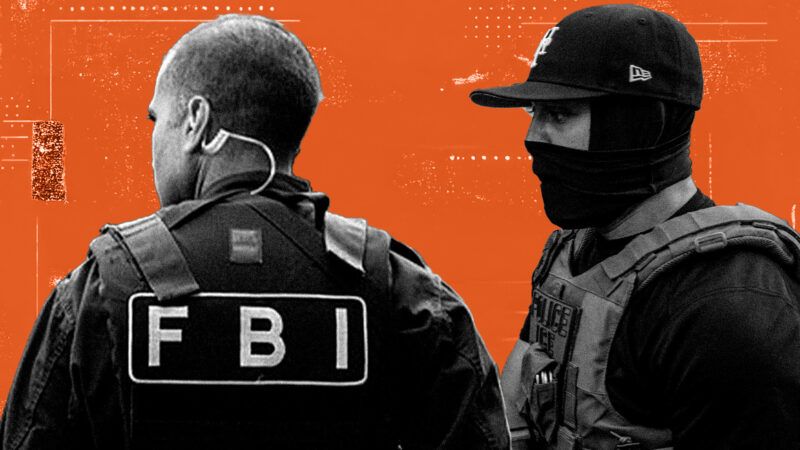Even the FBI Thinks Masked ICE Agents Are a Bad Idea
In a bulletin first reported by Wired, the bureau warns masked agents are easier for criminals to impersonate.

President Donald Trump's second term has been marked by increased immigration enforcement actions across the country. Worse, officials often hide their identities during raids—wearing face masks, driving unmarked vehicles, and not displaying badges or insignias identifying the agency they represent.
"Practically speaking, there is no reason for law-enforcement agents to conceal their identities, wear face masks, and grab people off the street without identifying themselves," Steven Greenhut wrote last month at Reason. "How is an ordinary person supposed to know whether their abductor is a legit government agent or kidnappers from a drug cartel? In the former, fighting back will land you in the morgue—in the latter, not fighting back will do so."
But there are other reasons why Immigration and Customs Enforcement (ICE) agents in masks make all of us less safe. Another branch of federal law enforcement has reportedly come to that conclusion as well.
"Criminals posing as US immigration officers have carried out robberies, kidnappings, and sexual assaults in several states, warns a law enforcement bulletin issued last month by the Federal Bureau of Investigation," Dell Cameron and Caroline Haskins write at Wired. "The bulletin cites five 2025 incidents involving fake immigration officers and says criminals are using Immigration and Custom Enforcement's heightened profile to target vulnerable communities, making it harder for Americans to distinguish between lawful officers and imposters while eroding trust in law enforcement."
ICE stepped up raids across the country as soon as Trump took office. Less than a week after his inauguration in January, police in North Carolina arrested a man who sexually assaulted a woman by impersonating an ICE officer and threatening to deport her if she didn't have sex with him.
The following month, a man in New York City tried the same thing, impersonating an ICE officer and directing a woman off the street, where he "allegedly forced her into a basement stairwell, punched her and tried to rape her," according to ABC News.
And in April, a woman in Panama City Beach, Florida, wore a mask and an ICE shirt into a hotel, where she forced the desk clerk into a car and took her cell phone, saying she was there to take her to jail; it turns out the clerk was married to the impersonator's ex-boyfriend, and the fake agent was later arrested for kidnapping.
Unfortunately, this problem has only gotten worse.
"A CNN review of court filings, social media posts and local news stories has found two dozen incidents of people posing as ICE officers in 2025, in cases that range from political agitators seeking to intimidate immigrants to others using the guise of authority to allegedly kidnap, rob, assault or rape victims," the outlet reported last month. "That represents a notable jump—more incidents than during the prior four presidential terms combined, dating back to President Barack Obama's first term in office."
"To keep women safe, we must effectively address the ability of perpetrators to so easily impersonate an ICE agent," members of the Democratic Women's Caucus wrote in a letter to federal officials, including Department of Homeland Security Secretary Kristi Noem, in August. "Without outlined protocols and specific regulations, anyone can now throw on a fake ICE jacket, put on a mask, and claim to be an ICE agent to deceive and attack women. Whereas local police officers are required to have distinguishable forms of identification, including official badges and photo identification, that help individuals determine their legitimacy. ICE agents should not be excluded from such policies especially when it is clear that women's safety and law enforcement legitimacy are at stake."
The FBI bulletin, which the bureau so far has not addressed publicly, represents a refreshing break with other federal agencies' insistence that there is nothing wrong with masked agents operating anonymously. "The growing use of such unmarked officers has raised questions for months about accountability and transparency in federal policing," note Cameron and Haskins. "However, the Trump administration frames ICE mask use as an officer-safety measure best left to the discretion of field leaders."
"When our heroic law enforcement officers conduct operations, they clearly identify themselves as police while wearing masks to protect themselves from being targeted by known and suspected gang members, murders, and rapists," DHS posted in May on X.
Ironically, agents who wear masks and act anonymously have put American citizens in more danger from some of those very same groups.


Show Comments (94)